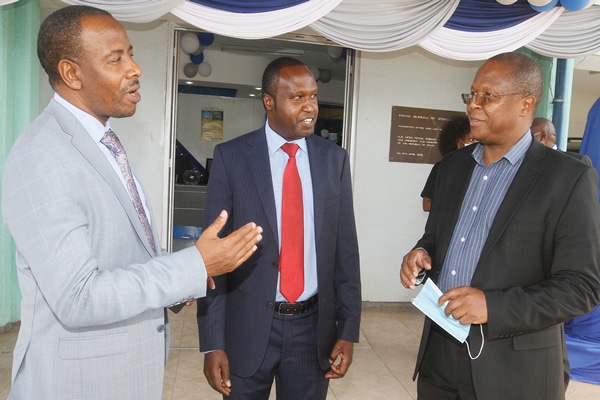National Standards Council Secretary Lt Col (Rtd) Bernard Njiraini (left) with the Council chairperson Eng. Bernard Ngore(centre) and Taskforce on Standards and Quality Infrastructure Reforms in Kenya Chairperson Wachira Maina.
- Last year, NSC recommended retaining the current enforcement based national quality management structures for the next fifteen years to facilitate capacity building of voluntary options.
- The National Taskforce is expected to review and evaluate the entire Standards and Quality Infrastructure’s weaknesses and shortcomings and will include institutional architecture and arrangement to meet the Country’s goals of managing and mitigating risks to quality, health, safety, environment, fair trade practices, and consumer protection.
The National Standards Council (NSC) is set for a series of grassroots visits to the Mt Kenya and Rift Valley regions this week.
While announcing the scheduled visits, the NSC chairman Eng Bernard Ngore said the Council members will be undertaking the fact-finding visits to establish the state of quality standards compliance.
He added that regional visits to other parts of the Country are also lined up as the NSC seeks to promote adherence to Standards, Metrology and Conformity Assessment Systems.
The visits, he added, will also provide a much needed public engagement platform geared at sensitising stakeholders on the National quality standards policies and regulations.
On Monday through to Wednesday, the National Standards Council (NSC), which is also the Kenya Bureau of Standards (KEBS) Board of Directors, Eng Ngore said, will be in Meru and Nyeri counties. The NSC has scheduled courtesy call engagements to the respective County leadership teams with site visits to large manufacturing enterprises and small and medium enterprises.
On Thursday and Friday, the Council Members who will be accompanied on the five-day tour by the NSC Secretary, who is also the KEBS Managing Director Lt. Col. (Rtd) Bernard Njiraini and senior KEBS officials will be in the South Rift region with scheduled visits to Nakuru and Naivasha.
“The NSC is currently rolling out its strategic plan with specific emphasis on stakeholder engagements’ which will feature grassroots consultations to promote the uptake of quality standards including the ISO quality management system,” Eng Ngore said, adding that, “The state of the national economic production ecosystem comprising of jua kali and large industries alike calls for closer collaborative interactions to promote the adoption of quality standards.”
Last year, NSC recommended retaining the current enforcement based national quality management structures for the next fifteen years to facilitate capacity building of voluntary options.
In its submission to the Taskforce on Standards and Quality Infrastructure Reforms in Kenya, the council recommended the maintaining of existing structures; based on international benchmarks in the continent and beyond.
The National Taskforce chaired by Constitutional and Governance Expert Mr Wachira Maina is expected to review and evaluate the entire Standards and Quality Infrastructure’s weaknesses and shortcomings. Such review will include institutional architecture and arrangement to meet the Country’s goals of managing and mitigating risks to quality, health, safety, environment, fair trade practices, and consumer protection.
As currently structured and thanks to access to national operating resources, the NSC, through KEBS, has been spearheading product certification efforts that enable products to access markets. As of the end of the second quarter of 2019/20, a total of 13,754 products (2,884 MSME and 10,870 from larger firms) had valid permits. KEBS has incubated medium-small and micro-enterprise to improve the quality of their products. In the FY 2019/20 to-date, 786 MSMEs were incubated.
Over the years, KEBS has successfully managed to institute measures to improve organisational capacity and capability to meet client needs while securing national interests.
From its humble beginnings, KEBS has enjoyed sustained growth from the development of Kenya’s first KS 07-01 standard in 1976 to develop 10,126 Kenyan Standards. By the end of May 2020, KEBS, he further disclosed, had managed to harmonise 716 East Africa Standards and currently enjoys the counter endorsement of 1,136 International Standards.
KEBS is one of the Agencies in the Multi-Agency Team constituted under the President’s Office to fight illicit trade. As currently structured, KEBS has been instrumental in supporting the Multi-Agency Team activities through Standardization, Metrology and Conformity Assessment. Also, KEBS supported the development of the National Action Plan and Implementation Framework to Combat Illicit Trade, currently being implemented.
KEBS is one of the reference centres for training and standardisation in Africa. It is also a centre of traceability for National Metrology Institutes in the region, which provides an opportunity for knowledge transfer. KEBS is the third-largest quality infrastructure institution in Africa, after South Africa and Egypt. This includes establishing a standards development system, membership and active participation in the Intra-Africa Metrology System (AFRIMETS) and African Electro Technical Standardization Commission.

